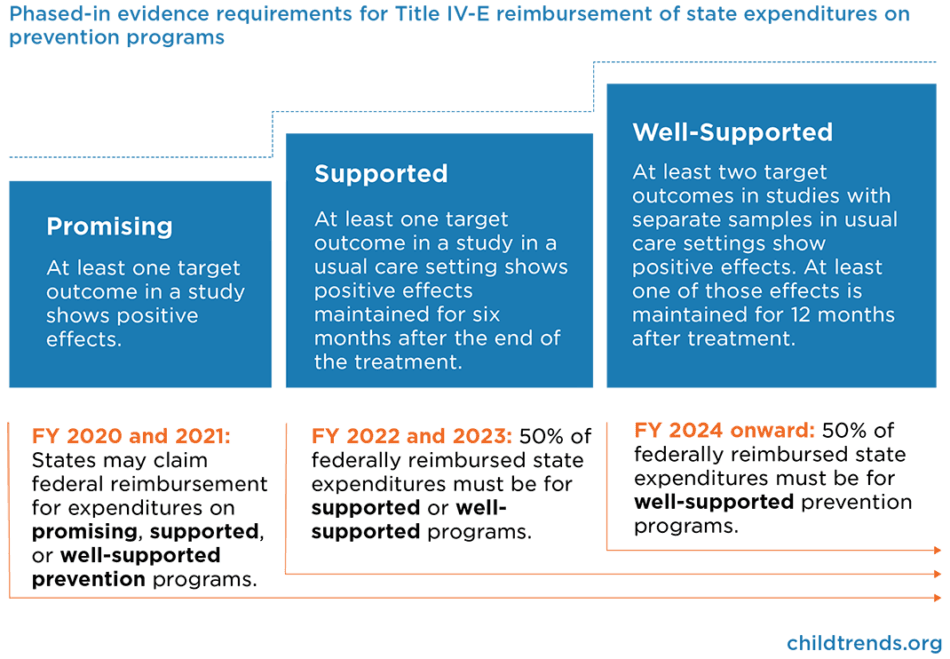The Family First Transition Act Provides New Implementation Supports for States and Tribes
In December 2019, Congress passed and the president signed the Further Consolidated Appropriations Act, 2020. This spending bill includes the Family First Transition Act (“Transition Act”), which was designed to support states and tribes in their implementation of the 2018 Family First Prevention Services Act (“Family First Act”). Among its other provisions, the Family First Act changed the existing child welfare financing structure by allowing all states to use Title IV-E of the Social Security Act (the largest federal funding source for child welfare activities) to fund evidence-based services that keep children safely with their families and prevent entry into foster care.
The Transition Act is one of several recent policy developments that support states as they face challenges in implementing the Family First Act.
Specifically, the Transition Act:
- Slows the roll out of the evidence-based requirements for prevention programs by temporarily suspending the requirement that 50 percent of state prevention program expenditures must be for the highest evidence tier of programs (those that are classified as well-supported). This gives jurisdictions and program developers more time to examine programs’ existing evidence and to begin strengthening the evidence base for prevention programs that qualify for Title IV-E funding. The Further Consolidated Appropriations Act also provides an additional $2.75 million for the Title IV-E Prevention Services Clearinghouse to review and rate evidence-based programs, as well as $20 million in grants for developing, enhancing, or evaluating kinship navigator programs. As noted in a recent brief, states face significant challenges in identifying evidence-based programs and building the evidence base as they strive to implement the Family First Act.
Download

Sources: Criteria for promising, supported, and well-supported from the Title IV-E Prevention Services Clearinghouse Handbook of Standards and Procedures (Version 1.0). Timeline for implementation from the Further Consolidated Appropriations Act, 2020.
The Transition Act also:
- Appropriates an additional $500 million to support implementation of the Family First Act, with 3 percent of that amount reserved for tribes. These transition funds are an important acknowledgment of the substantial work required from states to update their infrastructure and launch new initiatives and programs related to the Family First Act. The Children’s Bureau, the federal agency tasked with implementing the Act, plans to award the transition grants in late 3rd quarter or early 4th quarter of FY 2020.
- Assists states that participated in the Title IV-E Waiver Demonstration Projects—which provided states with greater flexibility in how they used federal funds and ended at the conclusion of fiscal year (FY) 2019—by limiting the permissible percent decrease in Title IV-E funds in FY 2020 and FY 2021. The end of the waiver demonstration projects means that states’ Title IV-E reimbursement will be calculated according to the number of Title IV-E eligible children receiving qualifying services, which may decrease federal funding to some states; however, the Transition Act ensures that the decrease happens gradually over the next two years. For state fiscal year (SFY) 2016, 27 states reported IV-E waiver expenditures at a total of over $2 billion. Child Trends will continue to assess how states fund their child welfare systems to better understand the implications of this shift over time.
By supporting states in preparing for Family First implementation, the Transition Act helps ensure that the Family First Act achieves its intended vision of helping children remain safely at home with their families rather than experience the trauma of entering foster care. The extended timeline for full implementation of the evidence requirements—along with recent policy guidance clarifying that states can allocate Title IV-E administrative funds toward evaluations of prevention services that qualify under the Family First Act—will support efforts to build the evidence base for child welfare programs and ensure effective services.
The Family First Transition Act also renamed Title IV-B, Subpart 2 of the Social Security Act the MaryLee Allen Promoting Safe and Stable Families Program. This is a fitting tribute to MaryLee, who served as a brilliant and valued partner to Child Trends, a tireless advocate for all children, and a dear friend and mentor to many of us.
Download
© Copyright 2024 ChildTrendsPrivacy Statement
Newsletter SignupLinkedInThreadsYouTube